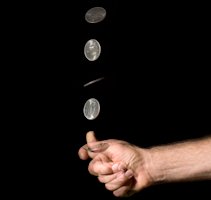
|
Some Common Myths Thought to be True - Myth 91
Myth 91: A Coin toss is Heads 25 times - Next most likely is Tails When an event with equally probable outcomes comes out the same way several times in succession, the other outcome is not more likely next time. For example, if a roulette ball ends up on black many times in a row, and not once on red (as reportedly happened 26 times on August 18, 1913, in the Monte Carlo Casino), the next ball is not more likely to land on red; red is not "due." For a fair wheel, neither is red less likely. This misconception is known as the gambler's fallacy; in reality statistical independence holds, and red is just as likely or unlikely on the next spin as always - sometimes expressed as "the system has no memory." If the event is physically determined, and not perfectly random, the repeated outcome may be more likely. For example, a die that has rolled a six ten consecutive times might be loaded or controlled by hidden magnets, and would be more likely to roll another six. |
| Coin Toss | |
|
The gambler's fallacy, also known as the Monte Carlo fallacy or the fallacy of
the maturity of chances, is the mistaken belief that if something happens more
frequently than normal during some period, then it will happen less frequently
in the future (presumably as a means of balancing nature). In situations where
what is being observed is truly random (i.e. independent trials of a random
process), this belief, though appealing to the human mind, is false. This
fallacy can arise in many practical situations although it is most strongly
associated with gambling where such mistakes are common among players.
|
|
| ⇦ Back to Myth 90 Return to Myth Choices Page 7 On to Myth 92 ⇨ | |